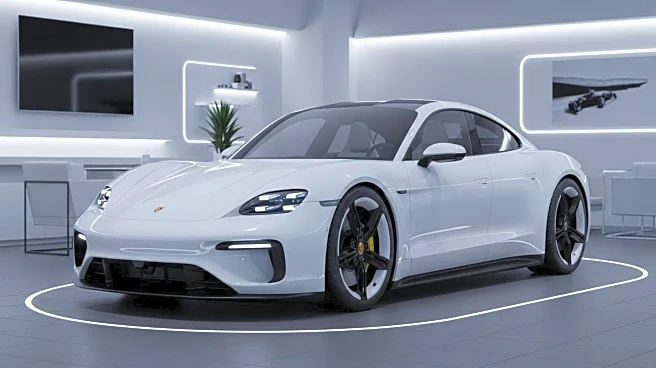What's Happening?
Porsche is steadfast in its decision to transition the 718 Boxster and Cayman models to fully electric vehicles, despite slower-than-expected EV adoption rates. The company plans to phase out internal combustion engines for these models, with the last ICE-powered cars set to leave the assembly line soon. Frank Moser, Vice President of the 718 and 911 lineups, emphasized the brilliance of the upcoming electric models, highlighting their lightness and power as key attributes. Porsche's collaboration with Audi on a shared platform for electric sports cars is part of a strategy to manage costs and achieve economies of scale, although the shift to electric may not resonate with traditional enthusiasts.
Why It's Important?
Porsche's commitment to electric sports cars reflects broader industry trends towards sustainability and innovation. This move is significant as it aligns with global efforts to reduce carbon emissions and transition to cleaner energy sources. The decision impacts the sports car segment, which is shrinking, and challenges Porsche to maintain its appeal among enthusiasts who favor combustion engines. The collaboration with Audi and the Volkswagen Group could set a precedent for future automotive partnerships, influencing market dynamics and technological advancements in electric vehicle production.
What's Next?
The next-generation electric Boxster and Cayman are expected to debut around 2026, marking a pivotal moment for Porsche as it navigates the complexities of electric vehicle design and production. The company faces the challenge of balancing performance with sustainability, while addressing consumer expectations in a niche market. Porsche's approach to integrating advanced battery technology and optimizing vehicle weight will be crucial in determining the success of these models. The industry will be watching closely to see how Porsche adapts to the evolving landscape and whether it can maintain its reputation for high-performance sports cars.
Beyond the Headlines
The transition to electric sports cars raises questions about the future of automotive design and the cultural shift away from traditional combustion engines. Porsche's decision may influence other luxury brands to accelerate their own electric vehicle strategies, potentially reshaping consumer perceptions and driving innovation in the sector. The environmental impact of this shift, along with the technological challenges of developing efficient electric drivetrains, underscores the complexity of the automotive industry's path towards sustainability.











